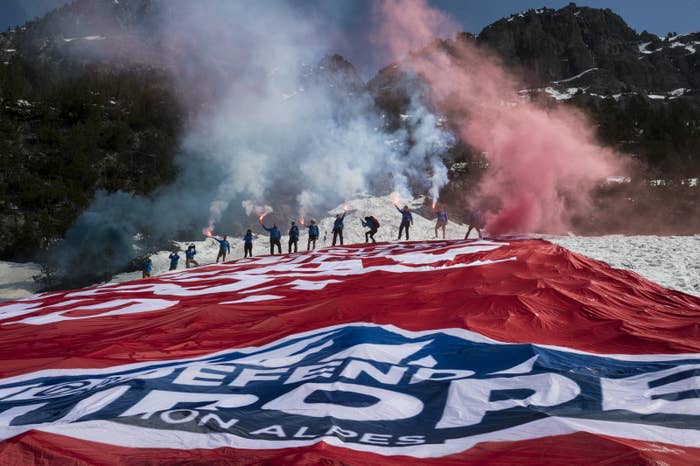
PARIS — A French prosecutor called for prison sentences on Thursday for three leaders of a far-right group that took money from the Christchurch shooter.
The defendants, Clément Gandelin, Romain Espino, and Damien Lefèvre, are leaders of the French branch of Generation Identity, or Génération Identitaire, an anti-immigrant group best known outside Europe for a stunt in summer 2017 to disrupt rescues of immigrants in the Mediterranean. Later that year, it accepted a 2,200-euro donation from the Christchurch shooting suspect.
The French prosecutor’s proposed sentence — 6 month's jail time for the three leaders as well as the maximum possible fine of 75,000 for the organization as a whole — is the first time Generation Identity has had charges against it brought before a judge since its connection to the Christchurch shooter was first reported. A judgment is expected on Aug. 29.
When the link between the Christchurch suspect and the Generation Identity chapter in Austria emerged in March, Austrian officials immediately ordered raids on the branch's leader, popular white nationalist YouTuber Martin Sellner. Germany has followed suit, stepping up its domestic surveillance on Generation Identity. France has, until now, taken no direct action against the group, despite repeated calls by anti-racism NGOs for its dissolution.
"It's a first step in dealing with this group," Justine Bourasseau, a legal expert working with French NGO SOS Racisme, which has sought four times since 2017 to have the group banned under a French law that prohibits “incitement to racial hatred.”
"They needed to be condemned to show them that, in fact, they do not have the right to do whatever they want," Bourasseau continued.
The men were tried in Gap, a small city near France's Italian border. The charges relate to an incident in 2018, when more than 100 members blocked the road to people trying to enter France from Italy.
They used an expensive array of means to do so — drones, a fleet of 4x4s, and even two helicopters and a light aircraft rented for the occasion — funded by donations that got a boost from the Twitter network of ex–Ku Klux Klan leader David Duke in the United States. Generation Identity declined to provide a comment to BuzzFeed News.

The French arm of Generation Identity was founded in 2012 by former members of Unité Radicale, a far-right group that was banned following a plot to assassinate then-president Jacques Chirac. Its ties to the alleged Christchurch shooter should have been a major wake-up call to security officials, said Dominique Sopo, the president of SOS Racisme, in an interview with BuzzFeed News in March. The group also has close ties to France’s second-largest party, Marine Le Pen's National Rally. An Al Jazeera documentary released last year showed that figures high up in the party, such as Nicolas Crochet and Frédéric Chatillon, who are known to be Le Pen's "men in the shadows," have supported the French group. And one of the three convicted activists, Damien Lefèvre, is a parliamentary assistant for National Rally MP Gilbert Collard.
Despite this, French officials advise caution before completely banning the French branch of Generation Identity: "When we engage this procedure of dissolution, we have to be sure that everything is well done, and go right to the end of the procedure," Frédéric Potier, director of the French antidiscrimination agency known as DILCRAH, said in a phone interview with BuzzFeed News. "There is nothing worse than [a request for dissolution] being refused by the justice system: It reinforces and legitimates [the French extension of the organization]."
Up until this instance, the French government had not taken any legal action against Generation Identity as a movement, relying instead on its new anti–hate speech law to trigger suspensions of members' Facebook accounts on a case-by-case basis.
"We think it's totally inadmissible. ... The government is not doing enough," Bourasseau said.
CORRECTION
A sentence in this case is expected Aug. 29. A previous version of this story incorrectly stated that the defendants had already been sentenced.

